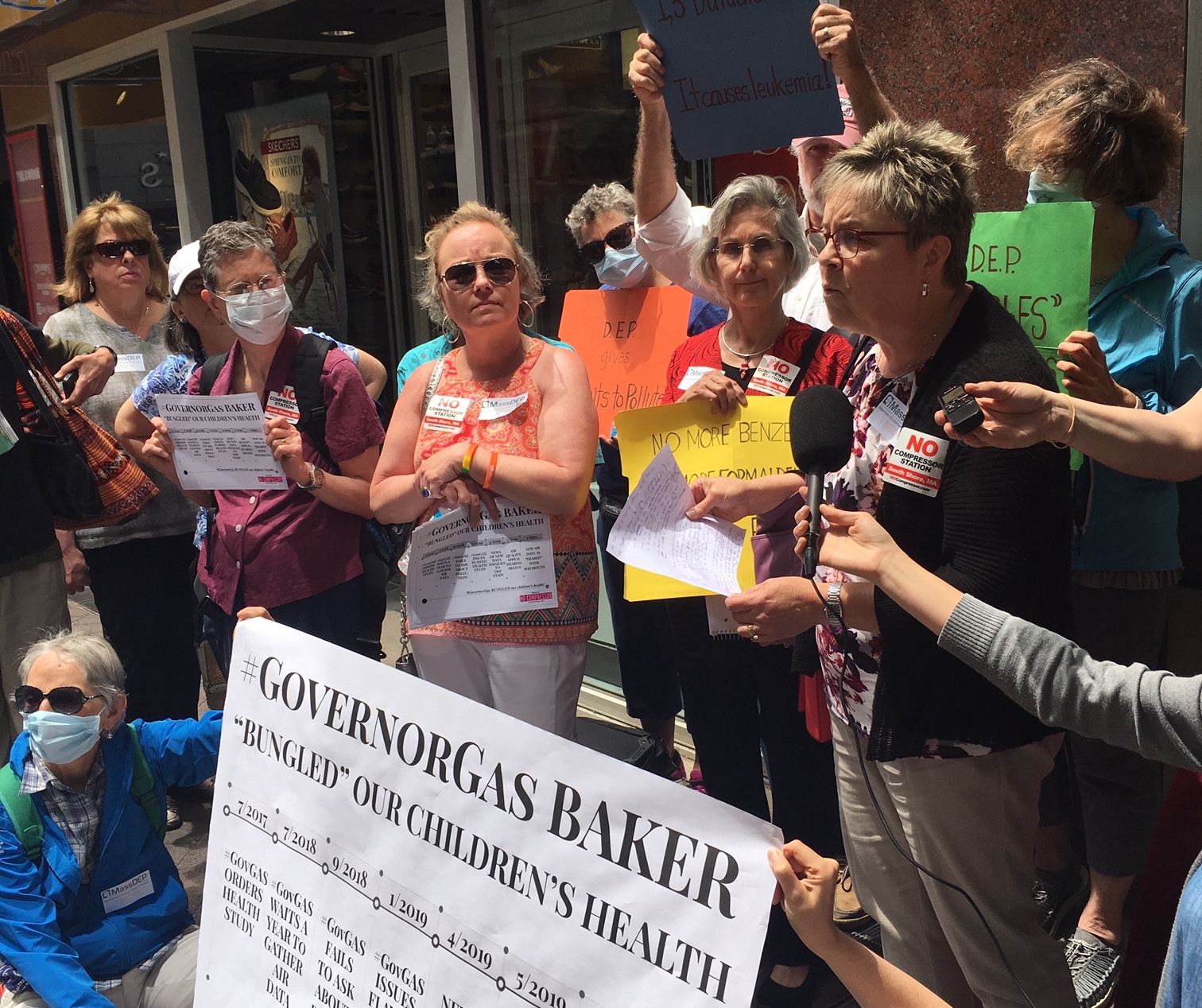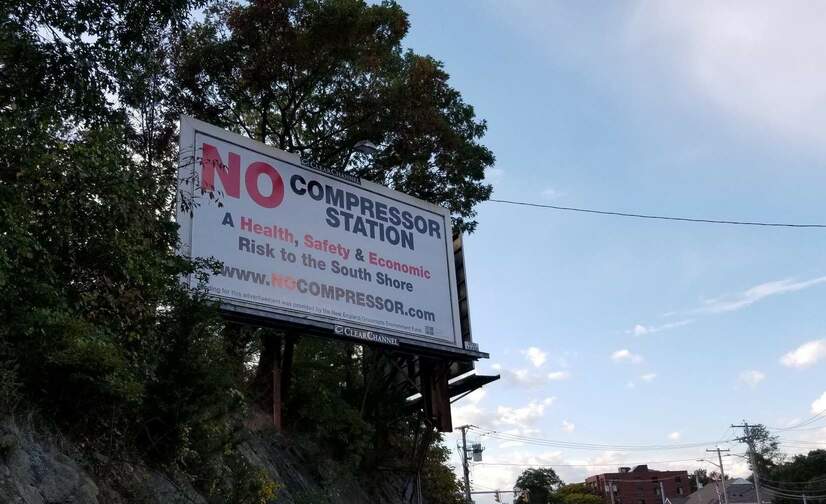In the wake of fresh revelations that a Massachusetts agency withheld critical air pollution data, calls on the state to retract a permit for a proposed natural gas compressor station in the greater Boston area have intensified this week.
In a letter Thursday to a Department of Environmental Protection (DEP) official presiding over an appeal on the permit for Enbridge’s facility in Weymouth, Representative Stephen Lynch (D-MA) slammed the DEP for what he called “gaping insufficiencies” in granting the permit, which “compromise the integrity of the DEP process.”
Invoking the need for “restoring trust and transparency,” Lynch called on the DEP to revoke its air permit for the Weymouth compressor station, which is part of Enbridge’s Atlantic Bridge project.
.@RepStephenLynch rips @MassDEP, calls for a fresh start on permitting (or not) the controversial Weymouth compressor #mapoli pic.twitter.com/h0Kt7z2eLe
— Adam Reilly (@reillyadam) June 13, 2019
His letter joined a number of state legislators who earlier in the week called on Governor Charlie Baker to intervene and halt the project. “This is a miscarriage of justice,” state Senator Walter Timilty told the Boston Herald. “The process itself is flawed.”
Representative Mark Cusack said the lack of transparency with data “creates a lack of any confidence in the DEP that this was a fair process.”
“The buck has to stop with someone,” Cusack added.
DeSmog’s Reporting Cited
The growing scandal was first set in motion by DeSmog’s revelation in April this year. According to that reporting, the DEP failed to disclose additional air monitoring it carried out at the densely populated site planned for the station — a small parcel of land near two environmental justice communities. Those tests, which were conducted for the DEP by a state lab in Rhode Island, showed elevated levels of various toxins and carcinogens.
Yet the DEP kept the data under wraps and did not include them in the health impact assessment (HIA) for the facility it conducted at the time.
9. In short: the DEP did not disclose these extra samplings during the HIA process & did not incorporate them into the HIA report. Even if it was indeed late in the game, the DEP could have at least asked RI for the results earlier, as they were analyzed back in September.
— Itai Vardi (@itai_vardi) April 19, 2019
During Monday’s hearings, DEP officials acknowledged for the first time that it was DeSmog’s reporting that prompted them to ask another lab it worked with on the HIA whether it held more data than it originally had supplied the DEP during the assessment. That lab, Alpha Analytical, did in fact hold additional data, which it began sharing with the DEP on May 10 this year, five days before the appeal hearings.
The DEP, however, informed the parties of the additional data — a 758-page report consisting of 24 new toxins not initially reported in the HIA — only toward the end of the hearings, on the evening of May 16.
The data indicated the presence of new toxins, including elevated levels of the carcinogen 1,3-butadiene. The HIA previously concluded that existing air quality levels, despite the presence of some carcinogens, were such that additional emissions from the proposed compressor station would not likely directly affect human health. That conclusion and the air permit based on it are now being called into question.
Calling the delayed data release an “unfortunate process,” the DEP’s presiding officer in the appeal, Jane Rothchild, said on Monday that the matter cast the DEP in a “not so favorable light.”
Rothchild will make a final decision on the permit by July 12.
At the hearing, attorneys for the project’s opponents grilled DEP staff on the eleventh-hour data dump. DEP’s director of air and climate programs Glenn Keith admitted the department knew of the existence of Alpha Analytical’s additional data in late April — three weeks before sharing it with the parties in the appeal and only after the opponents’ witnesses had already testified.
According to Keith, department staff needed to review the data before its release. He added that staff members’ actual presence at the hearings also delayed the release.
A DEP Under Fire
A billboard opposing Enbridge’s proposed Weymouth gas compressor station. Credit: Fore River Residents Against the Compressor Station, used with permission
During the hearings, DEP officials struggled at times to explain how, for nearly a year, they did not notice that the original air data was incomplete. Officials blamed the lab for an error, claiming the department first ordered the testing of 64 toxins but received a narrower list of 40 toxins.
Yet as DeSmog has previously reported, several internal DEP documents indicate officials were aware during the HIA they had originally received the limited list.
At the hearings, the department’s witnesses claimed ignorance of the differences between the lists, saying they did not know the two lists used different names on lab task order documents.
Alpha Analytical did not respond to several requests for comment.
State Agencies Stand by Assessment
Opponents of the project, who held a rally and press conference outside the hearing on Monday, said the new data is proof that the facility should not be built. Wearing facemasks and holding signs imploring Governor Baker to stop the project, they called the data dump “inappropriate and potentially illegal.”
Yet the DEP, along with the Department of Public Health (DPH) — which partnered with the DEP in overseeing the HIA — concluded the new data does not change the assessment’s conclusion that the station is not likely to affect human health through direct exposure. In a brief report published last week, the two agencies argue the pollutants found in Weymouth are consistent with background level pollution from two other Greater Boston communities which are monitored for air quality.
Ann Scales, a DPH spokesperson, said the department relied on DEP’s expertise in evaluating the new data.
Asked if the DPH had any concerns about what the new data indicated, Scales said: “DPH and MassDEP consulted on the evaluation of the new data, and DPH concluded that the revised Alpha Analytical Laboratory data does not change the baseline health profile or warrant review of additional health outcome data.”
Scales added that as part of the original baseline health profile for the HIA, the health department reviewed the incidence of 23 types of cancer for the nearby communities, including cancers of the blood and lymphatic system (which includes leukemia), which have been associated with occupational exposure to 1,3-butadiene.
“With the exception of non-Hodgkin lymphoma (NHL) among females in Hingham during 2006-2010, leukemia and lymphomas were not statistically elevated in these communities during these time periods,” said Scales. “A review of available NHL risk factor information for Hingham females and an analysis of the spatial distribution of diagnoses in Hingham did not show any unusual patterns, following state and national trends.”
PHMSA has scheduled a public listening session to examine the serious public safety issues relating to the construction & operation of the proposed Weymouth Compressor Station. You can find all the details here https://t.co/hn8TtUQAjp @RonMariano @MayorBobHedlund @PatrickMOConnor
— Rep. Stephen Lynch (@RepStephenLynch) June 13, 2019
Utilities May Benefit From Project
In another recent development, the watchdog group Public Accountability Initiative (PAI) has shone light on other powerful Massachusetts players who might benefit if Enbridge’s facility is approved.
Power-mapping by the group highlights that other than Enbridge, New England utilities are also likely to benefit from the compressor station, which would pump natural gas through a pipeline. According to PAI, Eversource and National Grid are minority investors in Algonquin Gas Transmission, the Enbridge subsidiary that owns the gas pipeline on which the compressor station will be built.
After the project’s opponents highlighted Eversource’s partnership with Enbridge and its close ties to Governor Baker, the company denied it is invested in the Atlantic Bridge project, saying it previously owned a stake in the pipeline as part of Enbridge’s now-shelved Access Northeast project.
But according to the latest Massachusetts corporate registration records, Eversource still holds a 15 percent stake in the Algonquin pipeline. Reid Lamberty, an Eversource spokesperson said that investment relates to the Algonquin Incremental Market (AIM), an expansion of the Algonquin pipeline to increase gas delivery into New England that went into service in early 2017. “We are not investors in the Atlantic Bridge project,” Lamberty told DeSmog.
Asked if Eversource’s ongoing stake in the Algonquin pipeline means that the company necessarily benefits from its upgrades — such as the construction of the Weymouth compressor station — Lamberty said “that’s not accurate,” but did not explain further.
Main image: Project opponents rally outside the permit appeal hearings on Monday, June 10. Credit: Itai Vardi, DeSmog
Subscribe to our newsletter
Stay up to date with DeSmog news and alerts








